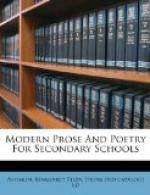NOTES
=Jamestown=:—A town in Virginia, the site of the first English settlement in America (1607).
=Appomattox=:—In 1865 Lee surrendered to Grant at Appomattox, Virginia.
=epic=:—A long narrative poem recounting in a stirring way some great series of events.
=Governor Spotswood=:—Governor of Virginia in the early part of the eighteenth century.
=Knights of the Golden Horseshoe=:—In 1716 an exploring expedition under Governor Spotswood made a journey across the Blue Ridge. The Governor gave each member of the party a gold horseshoe, as a souvenir.
=Celts=:—One of the early Aryan races of southwestern Europe; the Welsh and the Highland Scotch are descended from the Celts.
=Slavs=:—The race of people inhabiting Russia, Poland, Bohemia, and Servia.
=Latin races=:—The French, Spanish, and Italian people, whose languages are derived chiefly from the Latin.
=Orient=:—The far East—India, China, Japan, etc.
=Norman=:—The Norman-French from northern France had been in possession of England for the greater part of a century (1066-1154) when Henry, son of a Saxon princess and a French duke (Geoffrey of Anjou) came to England as Henry II, the first of the Plantagenet line of English kings.
=Stratford=:—A small town on the Avon River in England; the birthplace of Shakespeare.
=dight=:—Clothed. (What does an unabridged dictionary say about this word? Is it commonly used nowadays? Was it used in Shakespeare’s time? Why does the author use it here?)
=see it steady and see it whole=:—A quotation from the works of Matthew Arnold, an English poet and critic.
SUGGESTIONS FOR STUDY
What has been the disadvantage of having our history written by New England men? Do you know what particular New England men have written of American history? What state is President Wilson from? What is meant by the “Suppression of the South”? Why does the author put in the phrase “we have learned”? Does he believe what he is saying? Show where he makes his own view clear. What “story” is it that one “almost wishes” were true? Went out from the North: Where? How are the Northerners and the Southerners changed after they have gone West? What “new temper” do they have? How do they show their “impatience




